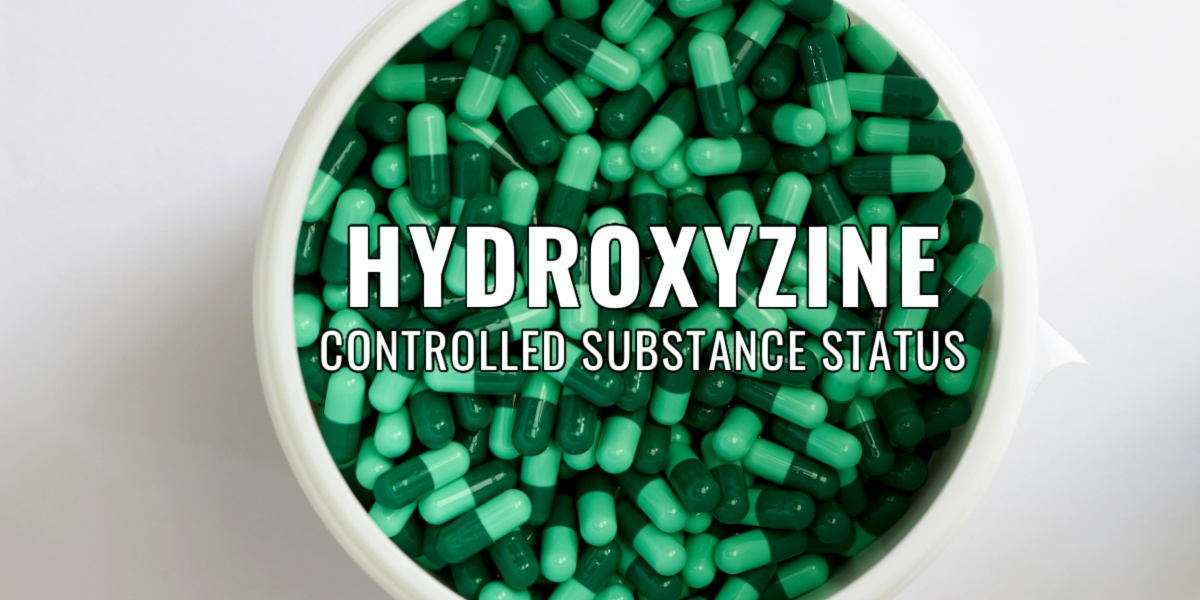Hydroxyzine is an antihistamine medication with various uses, including as an anxiolytic and an allergy treatment. Hydroxyzine is not a controlled substance, and its use is unlikely to lead to dependence, abuse, or addiction. However, the use of hydroxyzine can cause some risks, and its misuse could increase the risk of addiction among some individuals.
- Hydroxyzine is an antihistamine used to treat allergies and anxiety.
- Hydroxyzine is not a controlled substance, as it is not considered to have the potential for abuse or addiction.
- Hydroxyzine use can lead to adverse effects and, for some people, could increase the risk of concurrent substance misuse and addiction.

Is hydroxyzine a controlled substance?
No, hydroxyzine is not a controlled substance. Hydroxyzine is not listed as a controlled substance in the Controlled Substances Act. Controlled substances are listed from Schedule I-V, depending on their medical use, abuse and addiction potential, and potential harm. Hydroxyzine is not considered to be an addictive substance or drug of abuse. [2]
Hydroxyzine is an antihistamine with various medical uses. It can be used to treat allergies, anxiety, nausea, and as a sedative before and after surgery. [1] Hydroxyzine has a depressant effect on the central nervous system (CNS), contributing to its anxiolytic and sedative effects. [1] Other medications can have similar effects. For example, opioids and benzodiazepines are CNS depressants, but unlike hydroxyzine, they are controlled substances.
For example, benzodiazepines are Schedule IV, and codeine, morphine, and oxycodone are Schedule II. This means that these substances have more abuse and addiction potential than hydroxyzine. [3]
Because of the impact on the CNS, hydroxyzine, opioids, and benzodiazepines can all have similar effects, such as sedation, drowsiness, and reduced anxiety. However, hydroxyzine does not have the same potential for abuse, addiction, or dependence. [2]
Implications: Safety and abuse potential
Because it is considered low risk of abuse, hydroxyzine can be a safer option for the treatment of anxiety compared to alternatives such as benzodiazepines. [2] However, its use in anxiety treatment for longer than four months has not been extensively studied. As such, when it is used for this purpose, regular reviews are recommended to evaluate its effectiveness and any side effects. [1]
Additionally, although it is not considered a drug of abuse, hydroxyzine could be associated with drug misuse. Hydroxyzine can enhance the sedative effects of other CNS depressant drugs, which might lead to polysubstance misuse. [4] As such, despite not being classed as a controlled substance, hydroxyzine use can lead to certain risks. It could also cause dangerous interactions if used concurrently with other medications or substances. [1]
Is hydroxyzine addictive?
Hydroxyzine is not considered an addictive substance. It does not cause euphoric ‘highs’ and it is unlikely that its use will lead to physical or psychological dependence. If it is not misused, hydroxyzine is unlikely to lead to addictive or drug-seeking behaviors. [2]
However, people who use hydroxyzine for an extended period may experience some mild withdrawal symptoms when stopping, which could be unpleasant. [5]
Additionally, people with substance addiction issues may be more likely to abuse hydroxyzine. Using hydroxyzine alongside certain other drugs, such as opioids or benzodiazepines, can cause enhanced sedative effects. As such, although hydroxyzine itself is not addictive, it could contribute to addictive behaviors.



-guide-detail.jpg?v=1749634570)
-guide-detail.jpg?v=1722502510)